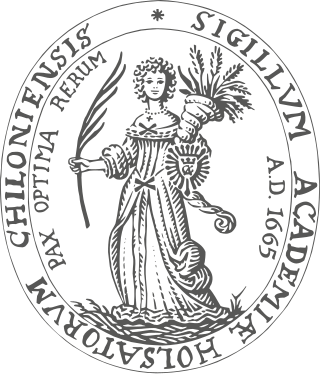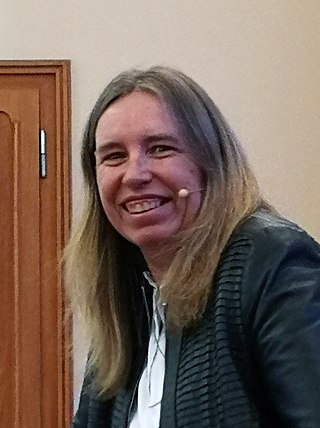
Christiane (Janni) Nüsslein-Volhard is a German developmental biologist and a 1995 Nobel Prize in Physiology or Medicine laureate. She is the only woman from Germany to have received a Nobel Prize in the sciences.

Kiel University, officially the Christian Albrecht University of Kiel, is a public research university in the city of Kiel, Germany. It was founded in 1665 as the Academia Holsatorum Chiloniensis by Christian Albert, Duke of Holstein-Gottorp and has approximately 27,000 students today. It is the largest, oldest, and most prestigious university in the state of Schleswig-Holstein.

The Gottfried Wilhelm Leibniz Prize, or Leibniz Prize, is awarded by the German Research Foundation to "exceptional scientists and academics for their outstanding achievements in the field of research". Since 1986, up to ten prizes have been awarded annually to individuals or research groups working at a research institution in Germany or at a German research institution abroad. It is considered the most important research award in Germany.

Stefan Walter Hell is a Romanian-German physicist and one of the directors of the Max Planck Institute for Multidisciplinary Sciences in Göttingen, and of the Max Planck Institute for Medical Research in Heidelberg, both of which are in Germany. He received the Nobel Prize in Chemistry in 2014 "for the development of super-resolved fluorescence microscopy", together with Eric Betzig and William Moerner.
Peter Becker is a German molecular biologist. He studied biology at the Ruprecht Karl University of Heidelberg until 1984 and finished his Ph.D at the German Cancer Research Center and the Ruprecht Karl University of Heidelberg in 1987. After being employed at the European Molecular Biology Laboratory (EMBL) from 1991 until 1999 he became head of the Adolf Butenandt Institute for molecular biology at the Ludwig Maximilian University of Munich. In 2000 he was elected as a member of EMBO.

The University of Freiburg Faculty of Medicine is the medical school and dental school of the University of Freiburg and forms university's biomedical research unit together the University Medical Center Freiburg. The faculty was founded in 1457 as one of Germany's oldest and is regarded among its most distinguished. Institutes and buildings are located at the Medical Center campus in Freiburg's Stühlinger district and in the Institute Quarter in the Neuburg district. The Faculty of Medicine consistently ranks very highly in a variety of national and international rankings, such as those published by the German periodicals Der Spiegel and Focus. The University of Freiburg is ranked 4th in Germany in funding for life sciences research by the German Research Foundation overall and ranked 2nd in funding per professor.

University Hospital Heidelberg is a university hospital in Heidelberg, Germany and is with 1,991 beds one of the largest medical centers in the country. It is closely linked to Heidelberg University Medical School which was founded in 1388 and is thus the oldest within the Federal Republic of Germany.

Matthias Werner Hentze is a German scientist. He is the director of the European Molecular Biology Laboratory (EMBL), co-director of the Molecular Medicine Partnership Unit between EMBL and Heidelberg University, and Professor of Molecular Medicine at Heidelberg University.
Stefanie Dimmeler is a German biologist specializing in the pathophysiological processes underlying cardiovascular diseases. Her awards and honours include the Gottfried Wilhelm Leibniz Prize of the German Research Foundation for her work on the programmed cell death of endothelial cells. Since 2008 she has led the Institute for Cardiovascular Regeneration at the University of Frankfurt. Her current work is focusing to develop cellular and pharmacological strategies to improve cardiovascular repair and regeneration. Her work aims to establish non-coding RNAs as novel therapeutic targets.

Anja Feldmann is a German computer scientist.

The Molecular Medicine Partnership Unit is an alliance between the European Molecular Biology Laboratory and the Medical Faculties of the University of Heidelberg. Its primary aim is to uncover the molecular basis of disease and to speed the transformation of biomedical discoveries into personalized medicine strategies.
Ilme Schlichting is a German biophysicist.
Elly Margaret Tanaka is a biochemist and Scientific Director at the Institute of Molecular Biotechnology of the Austrian Academy of Sciences (IMBA) in Vienna, Austria. Tanaka studies the molecular cell biology of limb and spinal cord regeneration as well as the evolution of regeneration.
The Chica and Heinz Schaller Foundation is a charitable foundation in Heidelberg, Germany. Established by the scientists Chica Schaller and Heinz Schaller, its main objective is to support young scientists within the Heidelberg Science Community
Jan O. Korbel is a German scientist working in the fields of human genetics, genomics and computational biology.
Elena Conti is an Italian biochemist and molecular biologist. She serves as Director and Scientific Member of the Max Planck Institute of Biochemistry in Martinsried, Germany, where she uses structural biology and biophysical techniques to study RNA transport and RNA metabolism. Together with Elisa Izaurralde, she helped characterize proteins important for exporting mRNA out of the nucleus.

Bernhard Wilhelm Roth is a German experimental physicist.
Stefan Mario Maul is a German Assyriologist and holder of the Gottfried Wilhelm Leibniz Prize.
Carmen Birchmeier-Kohler, is a German geneticist and developmental biologist. The focus of her research group is the development of embryonic tissues and the nervous system. The model organism for her investigations is the mouse.
Tatjana Tchumatchenko is a physicist in the field of theoretical neuroscience. She is an independent Max Planck Group Leader and, since November 2020, professor for Computational Neuroscience of Behavior at the Faculty of Medicine of the Rheinische Friedrich-Wilhelms-Universität Bonn (Germany). In her research she investigates how neural networks compute and how particular activity patterns emerge from synaptic and neuronal features.









